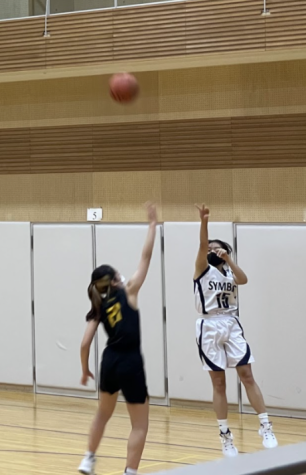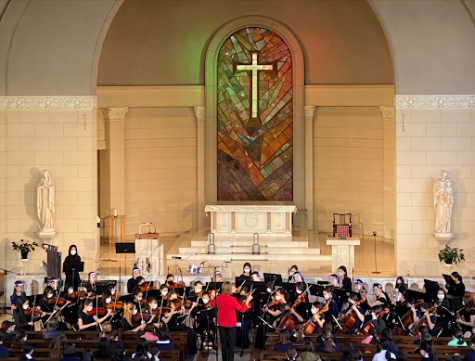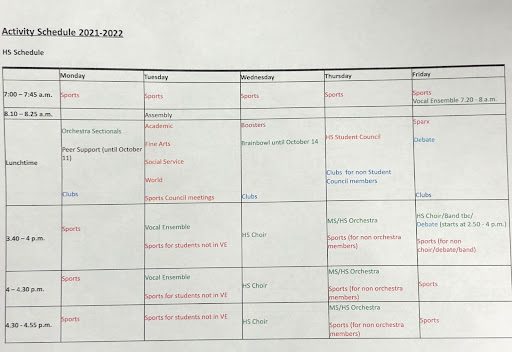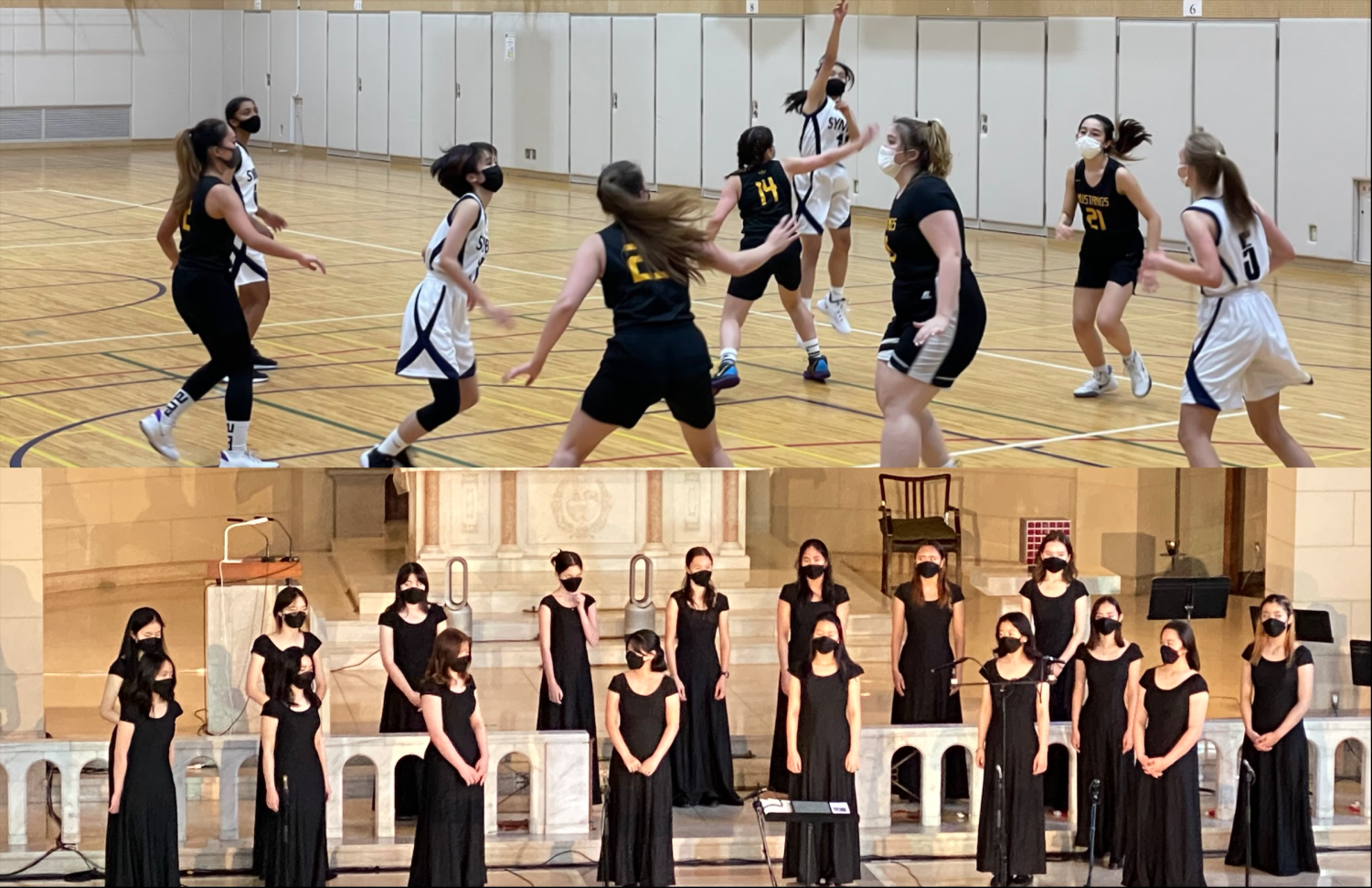How Sacred Heart students balance passion and workload
February 23, 2022
Stories from Sacred Heart students
Sports kids. Choir kids. Debate kids.
By the time we’ve settled into high school, most of us will fit into one of these categories based on our interests and extracurricular commitments.
For some of us, including myself, this is an easy decision to make, based on the activities that we are skilled in and passionate about. For others, there isn’t one clear answer. The decision-making process is much more complex for those who have interests in multiple fields, and struggle to prioritize one over the other.
When we are in middle school, it isn’t as important that we make a choice. Of the five 8th graders from Sacred Heart’s middle school newspaper – “The Student Outlook” – that I interviewed, three were committed to both seasonal sports and music activities (such as choir and orchestra), as well as activities outside of school. None of them had experienced scheduling conflicts before. Many of them expressed interest in joining sports in high school but were worried about whether they could still be a part of musical extracurriculars. They were also concerned about how they would balance their academic workload as classes became tougher.
As these students predicted, when we enter high school, making multiple commitments isn’t as easy. Therefore, it is common for students to leave one activity so they can fully commit to another. Take Millie T.B. (11), who was a violinist in the orchestra until the 8th grade, when she decided to prioritize her passion for sports, specifically volleyball. “There was a certain point where the enjoyment I was getting from [orchestra] and the time it was taking away [from volleyball practice] wasn’t [worth it],” said Millie. “I felt like I was losing more than I was gaining.” When she decided to take a break from the orchestra in her freshman year, Millie talked to Mr. Nicholson, who was very accommodating and accepting of her choice. “He was open to me joining again [sometime in the future], which I was really thankful for.”
Initially, Millie was slightly unsure as to whether she had made the right decision, especially during the Christmas concerts, which she had always enjoyed performing in. However, this slight regret paled against the relief she felt after making the decision. “I felt like I let go of something, and it was hard (…), but it made me feel like I was using my time more wisely.” Millie went on to make the varsity volleyball team as a freshman and currently does not express an interest in returning to the orchestra.

Rio T. (11) had a very different experience in making her choice. Though she had always been a part of many sports teams, primarily volleyball and basketball, in her sophomore year, Rio had been trying to decide whether or not she could be a part of the Vocal Ensemble and high school choir as well. “When I [watched] the Christmas concert, it looked really fun, and I really wanted to [perform in] it,” Rio said. But she soon realized that committing to both music and sports wouldn’t be as easy as she had assumed. To understand just how much work these extra commitments would entail, Rio had frequent discussions with Ms. Horn, who advised her on how best to make that choice. “We talked several times, and she always asked me, ‘What would you do if you decided to do both sports and choir?” Rio recalled. “And when I thought about that, it just wasn’t [possible].”
When asked about whether she thought she had made the right decision by deciding not to join Vocal Ensemble, Rio said that it wasn’t that simple. “At the time [when I first made my decision] I didn’t know if I made the right choice,” said Rio. “But [I realized that] it’s not like it was the right choice or wrong choice, it was just a choice that I made.” It was a choice that led to many accomplishments, such as making varsity and becoming a captain of the basketball team. “Because I couldn’t do music, I felt like it changed my motivation to do well in sports so that I don’t regret (…) the decision I made.”
Other students did not make a choice at all and continued to pursue all of their interests despite the difficulties of juggling all of these commitments. Take Sofia S. (10), who is a part of the high school choir, Vocal Ensemble, Honor Choir, orchestra, Student Council, as well as cross country and basketball during their respective seasons. However, she hadn’t discovered her passion for most of these activities until she came to Sacred Heart in middle school. “I saw an opportunity, took advantage of it, and now I enjoy it,” she wrote in an email. Since realizing her talent and interest in music and sports, she has been committed to pursuing both.

Being a part of multiple extracurriculars in different fields does have its challenges. “I try to participate in each activity with a fresh, new mindset,” wrote Sofia. “But sometimes, it is hard to give my 100% energy [to] both [activities].” Even so, she cannot imagine having to give up any of her interests. “I never really feel overwhelmed with my commitments. In fact, I feel overwhelmed when I’m not able to do the activities that I enjoy.” In addition, she found that her coaches and directors were supportive and understanding of her situation, and allowed her to adjust her practice times to accommodate her schedule. She is extremely thankful for the opportunities that ISSH has given her to pursue multiple passions. “The fact that you can try different things and take part in many activities gives people a chance to discover their passions – not just one – and develop them.”
As you can see, there are many different ways that you can approach deciding between the various extracurricular activities provided at our school. For some, it was possible to find a way to balance all commitments so that they could continue pursuing all of their talents. For others, it was necessary to give up other interests so that they could focus their time and energy on one. But is there a way that our activities system can be changed so that fewer students have to make these difficult decisions?
Our school has done its best to make choices like Sofia’s an option for students with multiple passions. “I’ve always, as a coach, tried to compromise,” said Mr. Carreon. “I’ve always just tried to say, ‘Hey, we want you to commit to this team, but we also want to honor who you are as a person. (…) can we try to work out a system that’s appropriate?’”
However, this sentiment isn’t shared by all of our students. When she first started considering joining the Vocal Ensemble, Rio believed that it would be possible for her to commit to both sport and choral programs. However, she soon realized that “this was [not] the case. You have to choose one or the other.”
“The official answer would be: we tried really hard to set up minimal conflicts,” said Mr. Carreon. “Now, in reality, that sometimes gets really hard to do.”
But is there an alternative solution? Some teachers and students believe that there are. “A lot of my friends have to make decisions between music and sports even though they love both,” said Millie. She doesn’t think that this needs to happen, and thinks that there is a way for the school to be better accommodating for students like her. “High school is the time to (…) experience as many things as possible,” she said. “Now is the time to do both music and sports,” and the time to make a decision between them “doesn’t have to be now.”
“One way to [fix this issue is to] make music part of the daily curriculum as most international schools in Tokyo already have,” said Ms. Horn, referring to schools such as ASIJ and St. Mary’s International School where musical activities are built into students’ schedules within the school day. This allows for the afternoon and evening to be reserved for sports, preventing clashing schedules. “It may sound simple, but it would take a lot of effort and energy to make it work,” she said. Building these activities into the curriculum would be a long and difficult process that could take years before it can be completely implemented.
Others think that it is possible for the school to be more accommodating for students with multiple interests by having a more consistent schedule for seasonal sports. Although the schedule for music rehearsals is relatively uniform throughout the school year, sports can be a different story. “Some sports practice every day, others practice three days a week; some sports practice in the mornings, others practice in the afternoons…” said Hana H. (11), who has been involved in choir, orchestra, and multiple seasonal sports since middle school. “Because there are seasons, and different coaches [teach] different sports, we can never tell.”
However, the scheduling system is different for unseasonal activities, such as choir and orchestra, for which “practice [times] are [consistent] for the whole year.” This makes the practice schedules for music activities and seasonal sports incompatible. Therefore, it is extremely difficult for students who are interested in more than one sport to also fully commit to a non-seasonal extracurricular activity.
Overall, most students and some teachers believe that the current extracurricular system makes it difficult to fully commit to multiple activities. Unfortunately, there is not a clear solution that can be introduced quickly and smoothly.
At this time, the most important thing to remember is that in the end, this decision is about you and what you want, and that you can always change your mind. This choice is not up to the administration, your coaches/directors, or me: it is up to you, the person who best understands your priorities and capabilities. And if you decide later on that you want to try something different, that’s okay, too. Since being interviewed for this article, Rio decided that she wanted to join the high school choir in her senior year after all.
Advice on how to make your choice
These students’ stories represent many different approaches towards deciding between and committing to your extracurricular activities. But how should you approach this process? How can you make sure that you make the right decision?
Here are some questions based on the advice of our coaches and directors to help guide you along the process of making your choice.
1. Which activity are you the most passionate about?
The most important thing to consider when choosing your extracurricular path is how strong your interest is. For some of us, this distinction isn’t clear. However, especially looking into your future, it is important to learn how to prioritize your interests.
Coach Ettl from the PE Department discussed the importance of considering all of your responsibilities before making a decision to ensure that you are ready to make a full commitment. “We want our student-athletes to be (…) committed to their sports, [but] (…) understand that they have other responsibilities as well,” she said. “It conflicts their decision-making, but it also helps them decide what they really want to pursue.” Balancing your passion and your responsibilities also means looking into the future and seeing how your decision today can affect your future. “Depending on their goals (..) they can decide how they’re going to focus their energy and attention,” said Coach Barnett, one of the varsity basketball coaches.
Of course, we all have multiple interests and talents, all of which we would pursue in an ideal world. Even so, prioritization is a difficult reality that we will face one day. Practicing this skill now will prepare you for the decisions you will make in university, as well as after you leave the school system. “And maybe that means that you’re not going to do music, or you’re not going to do sports, which is unfortunate, but [it] happens in real life,” said Ms. Horn, the director of the middle school and high school choirs and the HS Vocal Ensemble. “You just need to weigh your options and make your decision.”
2. Which activity will allow you to perform to your best potential?
Consider which extracurricular commitment will help you best demonstrate your strengths and lead you to future opportunities.
Ms. Shull, the debate team advisor, discussed how she used this question with a student who was struggling to decide between debate and music. “What I asked was, ‘What opportunities will each extra-curricular open for you in the future?’” she said. Ultimately, the student chose to continue pursuing music, since the leadership potential she had in the ensemble was greater than she had on the debate team.

Thinking about future opportunities in this way may mean that you decide not to continue pursuing all of the activities you were once part of or are passionate about. Even so, any skills you gained through one activity can contribute to your success in another if you can successfully apply them and use them to your advantage. Coach Barnett explained how you can change your mindset on prioritization by considering future potential. “Another way to look at it is, ‘Wow, I’ve accumulated all these skills. How can I make them work for what my interests are now?’” she said. “Nothing is wasted. All of these skills will help you.” She herself was once a part of many different activities, including various sports and singing. Later, she decided to focus her attention on basketball, and although her other passions took a smaller stage, they never disappeared from her life. “All those things helped me gather the skills I needed to be who I am now.” Prioritizing your interests based on your potential does not mean that all of your other skills are wasted; they’ll just be applied in a different way.
3. What kind of workload will balancing these commitments entail?
After you have established which activities you are passionate about and will help you reach your best potential, you must weigh them against their time commitment and workloads.
Though this includes mandatory practice/rehearsal times, you must also consider the time commitment you will have to make beyond them. Will you need to practice the skills you learned during activity time on your own? If so, for how long? How often? Ms. Horn explained that this commitment can vary from activity to activity. For example, high school choir requires little at-home practice time, and students will learn 90% of the repertoire during rehearsals. “I think a different story is Vocal Ensemble.” With a more challenging repertoire and fewer members, committing to the Vocal Ensemble requires students to do some work on their own, to “be sure you are doing everything you can for the group to succeed.”
Ms. Shull described conditions for the Debate team similarly. “It is a time commitment,” she said. Preparing for practice debates and tournaments can also be anxiety-producing for some students. Tournament dates are included in the school testing calendar so that teachers could consider the workload of Debate members when choosing testing dates.
Once you have committed to an activity, you want to make sure that you have enough time to make the most out of the opportunity you have been given. “The more that you’re able to put into it, the more you can get out of it,” said Ms. Shull.

Another issue that can arise, especially if you are participating in multiple activities, is scheduling conflicts. The school has an activities schedule, outlining the times designated for each extracurricular activity so that clashes can be avoided as much as possible. Despite the administration’s best efforts, there are certain activities that will inevitably conflict, and have conflicted for years. All of the coaches and directors have encountered this issue with many students. “We had one student come in and ask, ‘When are basketball practices going to be?’, and we told her,” said Mr. Carreon, the head of the PE department. “She [said,] ‘Oh, then I can’t try out,’ and (…) it was because of Vocal Ensemble. She was committed to that.” Similarly, students are forced to choose between Debate and high school choir because inter-school debates and choir rehearsals are scheduled for the same times.
Although these conflicts can be frustrating, it is important to understand the effort that was put into making the extracurricular schedule as accommodating as possible to the demands of every department. Mr. Carreon explained that he was aware of the amount of sacrifice and compromise that each teacher had to make in order to create the current structure.
But above all else, you must prioritize your own health. Considering time commitments also means taking care of yourself by making sure not to overcommit. Filling out your entire schedule deprives you of the time to relax and focus on your mental health. “One of the issues that come up more often for students in their Sophomore, Junior, and Senior years is that they are overcommitted,” said Mr. Carreon. Between academic work, extracurriculars, and commitments outside of school, students can easily become overwhelmed by the responsibility and pressure of taking on more than they can handle. If you do not give yourself enough time to take breaks, you won’t be able to enjoy high school life.
4. Who can you talk to to help you make this decision?
It can be nice to talk to others for advice or moral support on your decision. Rio T. explained that, in making her choice, she talked to some upperclassmen who had experienced a similar situation before. In addition to other students, it is a good idea to talk to your coaches and directors, even if it may seem a little intimidating to do so. They are the ones who are best equipped to advise you, and all of them have said that they would be more than happy to talk to their students, and would not take offense by their choice. “I don’t take those decisions personally,” said Ms. Horn. “The decision you make isn’t about me. It’s about you and the activity you chose.” The important thing is to be upfront and honest with your coaches about your situation. “Even if you don’t end up choosing my team, I still want to support you,” said Ms. Shull.
